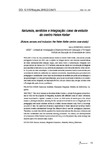Natureza, sentidos e integração: caso de estudo do centro Helen Keller

View/
Use this link to cite
http://hdl.handle.net/2183/23502
Except where otherwise noted, this item's license is described as Atribución-CompartirIgual 4.0 España
Collections
Metadata
Show full item recordTitle
Natureza, sentidos e integração: caso de estudo do centro Helen KellerAlternative Title(s)
Nature, senses and inclusion: the Helen Keller centre case studyAuthor(s)
Date
2018Citation
Romeiras Amado, M. (2019). Nature, senses and inclusion: the Helen Keller centre case study. Sarmiento. Revista Galego-Portuguesa De Historia Da Educación, 22, 13-36. https://doi.org/10.17979/srgphe.2018.22.0.5473
Abstract
[Resumo] O foco do meu presente estudo incide no Centro Helen Keller, uma escola privada
portuguesa fundada em 1955 com o objetivo de integrar alunos com diversas características
de visão, nomeadamente crianças cegas, com baixa visão e normovisuais. Integrada num
parque natural de Lisboa com 1012 hectares, esta escola dispõe de uma situação privilegiada
para assimilar a natureza na sua potência de educação e convívio a tão diverso corpo discente.
Do ponto de vista neurológico, a diversidade sensorial presente é assim desenvolvida pela
variedade de estímulos existentes na natureza envolvente, disponíveis para aproveitamento
pedagógico e socializante. Como fazer da diversidade de sentidos um ponto de socialização e
de aprendizagem é o meu principal interesse, para tal acompanhando a história e circunstâncias
desta escola integrada, de inspiração Freinet, até aos nossos dias, em que valores como
a Ecologia são parte do seu quotidiano [Abstract] This study focuses on the Helen Keller Center, a private Portuguese school founded in 1955 for the purpose of integrating students with different levels of vision: blindness, visual impairment or sighted. Located in Lisbon on 2500 acres of natural park, this school boasts a privileged situation, allowing for the natural environment to be an integral part of its pedagogical and social structure aimed at a widely diverse student body. From a neurological point of view, the spectrum of sensory experiences in these natural surroundings fosters balanced creative development through the different stimuli used for pedagogical purposes. Therefore, my main interest is to question the relationship between the discovery of nature and both the socialization and the sensorial learning processes. The history and developmental circumstances of this Freinet inspired school will bring us to the present day, when ecology has become part of the school’s daily routine.
Keywords
Natureza
Sentidos
Educação integrada
História da deficiência
Cegueira
Nature
Senses
Integrated education
Disability history
Blindness
Sentidos
Educação integrada
História da deficiência
Cegueira
Nature
Senses
Integrated education
Disability history
Blindness
Editor version
Rights
Atribución-CompartirIgual 4.0 España
ISSN
1138-5863






